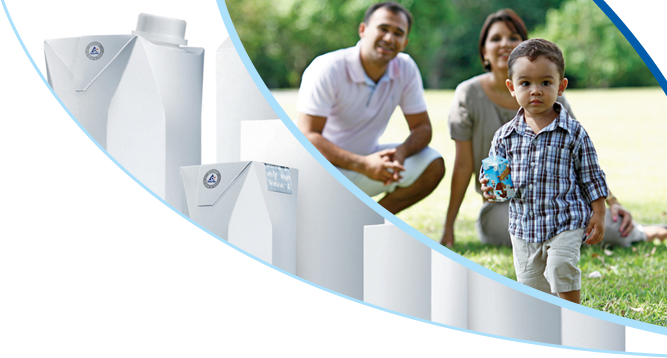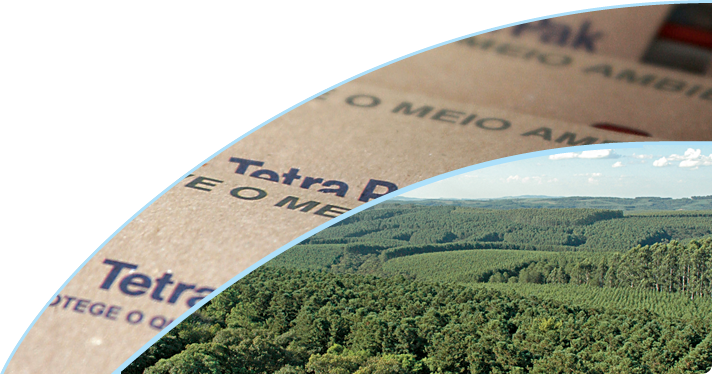Activities and
production in Brazil
• 2 plants
• 7 regional offices
• 1,613 employees
• 23 billion packages produced
over the past 2 years
• 2nd largest operation of the Tetra Pak Group in terms of sales volume and revenue
• 94.7% of Brazilian households
consume products in long
life packages
in 170 countries.

• 2.8 •
Tetra Pak is a company of the Swedish Tetra Laval Group, which also includes DeLaval and Sidel, with head office in Switzerland. They are all leading companies in their respective fields, operating in an independent but cooperative fashion to the benefit of their customers.
A limited liability family company, Tetra Pak operates in 170 countries including 39 local operations and 79 sales offices. A total of 22,896 employees (1,613 in Brazil) that have allowed for the delivery of 75.7 billion litres of products worldwide, filled into over 167 billion Tetra Pak packages, totalling €10.36 billion in world net sales in 2011.
Tetra Pak Brasil is the second largest operation of the Tetra Pak Group in terms of sales volume and revenue, second only to the Chinese subsidiary. The company is a global benchmark for technology and know-how, and it is one of the most efficient companies in the world in the sector according to the World Class Management (WCM) system.
 Tetra Pak's world business
Tetra Pak's world business
is based on four pillars:
growth, innovation, environment
and performance.
Tetra Pak Brasil
Profile
• 2.1 | 2.3 | 2.4 | 2.5 | 2.6 | 2.7 •
With head office in São Paulo, Tetra Pak Ltda. runs two packaging material industrial plants – Monte Mor (SP) and Ponta Grossa (PR) – as well as seven regional sales and technical service offices. Operating in Brazil for 54 years now, the company was decisive for the development of the food industry and the promotion of cultural changes.
An example of that was the introduction of the Ultra High Temperature (UHT) technology that contributed to the insertion of the long life milk in the country and which production doubled during the first decade of this century. Today, Tetra Pak packages – used also for fruit juices, water, sauces, creams, wines, foods, etc. – are present in 94.7% of Brazilian households according to a study by Kantar Worldpanel, Latin America's largest company dedicated to household consumption research.
The same technology allowed for the creation of coconut water in the carton. Previously wasted by the companies that processed the fruit's pulp, the coconut water has now a commercial purpose thanks to Tetra Pak's influence with the sector's manufacturers.
This capacity to develop solutions for the domestic market makes the company a role model in terms of safe packages that preserve the nutritional value of foods, reduce the costs associated to transport and storage, and minimize environmental impacts by allowing efficient production as well as recycling after consumption.
The company also offers food processing systems, filling machines, distribution equipment and customer support services. Having a full portfolio of products and services, the company operates in segments that comprise the pre-production, production, improvement and training stages.
Vision, Mission and Core Values
• 4.8 •
Vision: “We commit to making food safe and available, everywhere."
Mission: we work for and with our customers to offer the best food processing and packaging solutions. We apply our commitment to innovation, our understanding of consumer needs and our relationships with suppliers to deliver these solutions, wherever and whenever food is consumed. We believe in responsible industry leadership, creating profitable growth in harmony with environmental sustainability and good corporate citizenship.
Core Values: they show our commitment to ensure safe and available food everywhere in the world. This heritage is the basis for the behaviour of our employees and consolidation of our work.
- Customer-focus & Long-term View: We ensure we add value and inspire our customers because we recognize that they come to us by choice. We dare to lead with a focus beyond tomorrow and take opportunities to learn and grow.
- Quality & Innovation: We do not compromise on quality. We relentlessly drive for better, fit-for-purpose solutions and breakthrough innovations.
- Freedom & Responsibility: We have the freedom to take initiative and act decisively in the best interests of Tetra Pak and our customers. We take responsibility for our actions and contribute to the communities in which we operate.
- Partnership & Fun: We respect and rely on one another and all our employees for exceptional results. We enjoy working together and celebrating our achievements.
Certifications
In August 2011, the Monte Mor (SP) and Ponta Grossa (PR) plants, as well as the sales and technical service offices were externally audited by the Integrated Management System (IMS), which resulted in the recertification ISO 9001:2008 (Quality) and the maintenance of the OHSAS 18001:2007 (Safety & Health) and ISO 14001:2004 (Environment) certifications.
Tetra Classic
machine and Tetra Classic tetrahedric packages are developed
operations
in Brazil
reaches 1 billion units per year
life aseptic
package
is created
in Brazil in
Monte Mor (SP)
plant is opened
in Ponta
Grossa (PR)
of Custody
is launched
in Brazil
plant is expanded and record production reaches 11 billion packages
per year
out of sugar cane
ethanol is launched worldwide and production reaches 12 billion
packages per year
of employee Silvano Assunção
Corporate Governance
• 4.1 | 4.4 | 4.6 | 4.8 | 4.9 | 4.11 | SO2 | SO3 | SO4 •
Tetra Pak Brasil business is based on the best practices of corporate governance, guided by the principles of transparency, equality, accountability and corporate responsibility. These initiatives aim at translating the company's Vision, Mission and Core Values into day-by-day activities.
All leaders and managers sign a commitment to the corporate governance framework, the Corporate Governance Confirmation. By doing that they make sure they have done their best to apply the best practices within that period. All governance activities are globally audited every two years.
In Brazil, the company keeps a Corporate Governance Committee, consisting of five members from different departments, which is responsible for ensuring that the best practices are applied locally and transmitted to every employee. These concepts and policies are spread, among other activities, during the Corporate Governance Week, an annual event carried out since 2009 with a cycle of lectures to all employees.
The Committee also coordinates the Management Declaration, a process through which all employees commit to follow the group's local and global framework, policies and procedures, declaring the absence of conflicts of interest; and the Risk Assessment, a process which surveys and classifies the risks involved in each department of the company based on probability, potential impacts, actions and people in charge.
The experience with these activities is being shared with other units in South and Central America to allow for the creation of Corporate Governance Committees in other countries as well.
The actions of each employee are guided by the Code of Business Conduct, which is regularly revised by a member of the world board and by local officers. Every new employee is introduced to the Code during the Integration Program and receives a book contianing the full Code. The content of the Code can be found at Tetra Pak's intranet, Orbis.
Tetra Pak's policies support the Code of Business Conduct by means of guidelines applied to all administrators who receive annual onsite training, and to the remaining employees that get regularly training. They include:
Anticorruption Policy: regulates the relationship between our employees and suppliers, authorities, government, banks and service providers. The objective is to fight against fraudulent actions and bribery practice. People who work for Tetra Pak are instructed to act with transparency and never offer, ask or accept payments, hospitality, or advantages that may influence their decisions or make them dependent on the involved players.
Ombudsman Policy: Tetra Pak's employees are expected to report practices that are in disagreement with the corporate governance framework. All reports are investigated and the person reporting cannot be penalized. These practices can be reported to the employee's senior management, to the Corporate Governance Committee or to the Finance and Business Control, Legal or Human Resources executive directors. The report can also be sent anonymously by intranet. Over the past ten years the company has had no records of misconduct or corruption.
Audits: Tetra Pak group carries out a biannual Internal Audit focused on the corporate governance framework. Practices that are not compatible with the group's policies are identified and corrected. External audits on internal controls are carried out annually.
Guidelines: they help management and preparation of new policies. These directives may be part of the policies or be edited separately and should be followed to resolve matters not contemplated by other policies and procedures.
Procedures: all company procedures are detailed and mandatory, such as the Financial Reporting Manual, the Rules for Investment Approval and the Brands Use Manual.
BRAND
• PR5 •
Tetra Pak's motto "PROTECTS WHAT'S GOOD™" intends to add value and strengthen its brand. The use of the protection concept is linked to keeping something safe, defending, guarding looking after, taking good care. Its value is expressed by the fact that this is an active word used in the present tense; and by the association of the word "good" with synonyms like generous, beneficial, and healthy.
The motto is an extension of the company's Vision and applies to the whole value chain. Tetra Pak packages protect the food and help protect the environment: they are 100% recyclable and use paper (material from renewable source) as the major input. Besides using paper certified by the Forest Stewardship Council (FSC®), the company invests in other renewable materials, such as the cap produced out of sugar cane ethanol launched in 2011.
The brand value is measured annually by means of a brand reputation survey with employees, customers, suppliers and the general public carried out by the Reputation Institute. The results have been improving over the past few years, going from 77.6 in 2010 to 79.8 in 2011, which is considered excellent by the consulting firm and is comparable to major conglomerates operating in the country.
